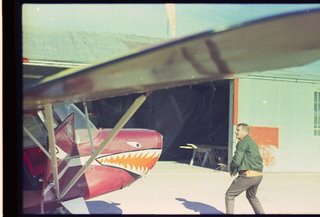Wednesday, August 30, 2006
The Roach

(3)
One of our trainers, an 'Aeronca Champ,' was nicknamed, 'The Roach.' I don't know why. Possible the name referred to the color. The Roach had the nose painted in the style of WWII P-40s: shark's teeth with eyes. It was a tandem seating (front and back) 65 hp airplane. The Roach had a reputation for burning (or losing) oil. You never flew The Roach (or any other airplane) without first checking the oil level. The photo shows me just after 'propping' The Roach, which did not have an electric starter. Hopefully there is somebody in the rear seat with his or her (tap) feet on the brakes.
I have 'propped' an airplane with nobody inside. Here is the procedure: throttle closed, mags off. Pull the prop through a few revolutions in order to get gas into the cylinders. Turn on the mags (the magnetos) and crack the throttle. Prop the airplane, ready to head immediately for the cockpit in case the engine becomes 'adventurous.' (More than one erstwhile pilot has suffered the unfortunate experience of having his airplane take off without him. It's very embarrassing.)
I made my only 'forced landing' in The Roach. I was flying along in the general vicinity of the Littleton-Columbine area when I noticed that the oil pressure was in the red. I closed the throttle and the oil pressure went immediately to zero. I had visions of a fried engine bursting into flame, and although I was almost midway between Columbine and Littleton, I looked around for a place to land. I spotted a 'runway-looking' farmer's field well within gliding range and began an approach. I was way high, but I had only one shot at it. I kicked in full right rudder and full left aileron, skidding the airplane so as to present as much drag as possible in order to slow the airplane and kill altitude.
The maneuver worked quite well and I was able to plant The Roach about 100 feet from the farmer's house. The local fire department arrived soon after. I called Littleton Airport and described the situation to them. Dale Ruoff and wife, and John Hurd arrived soon after with supplies of oil.